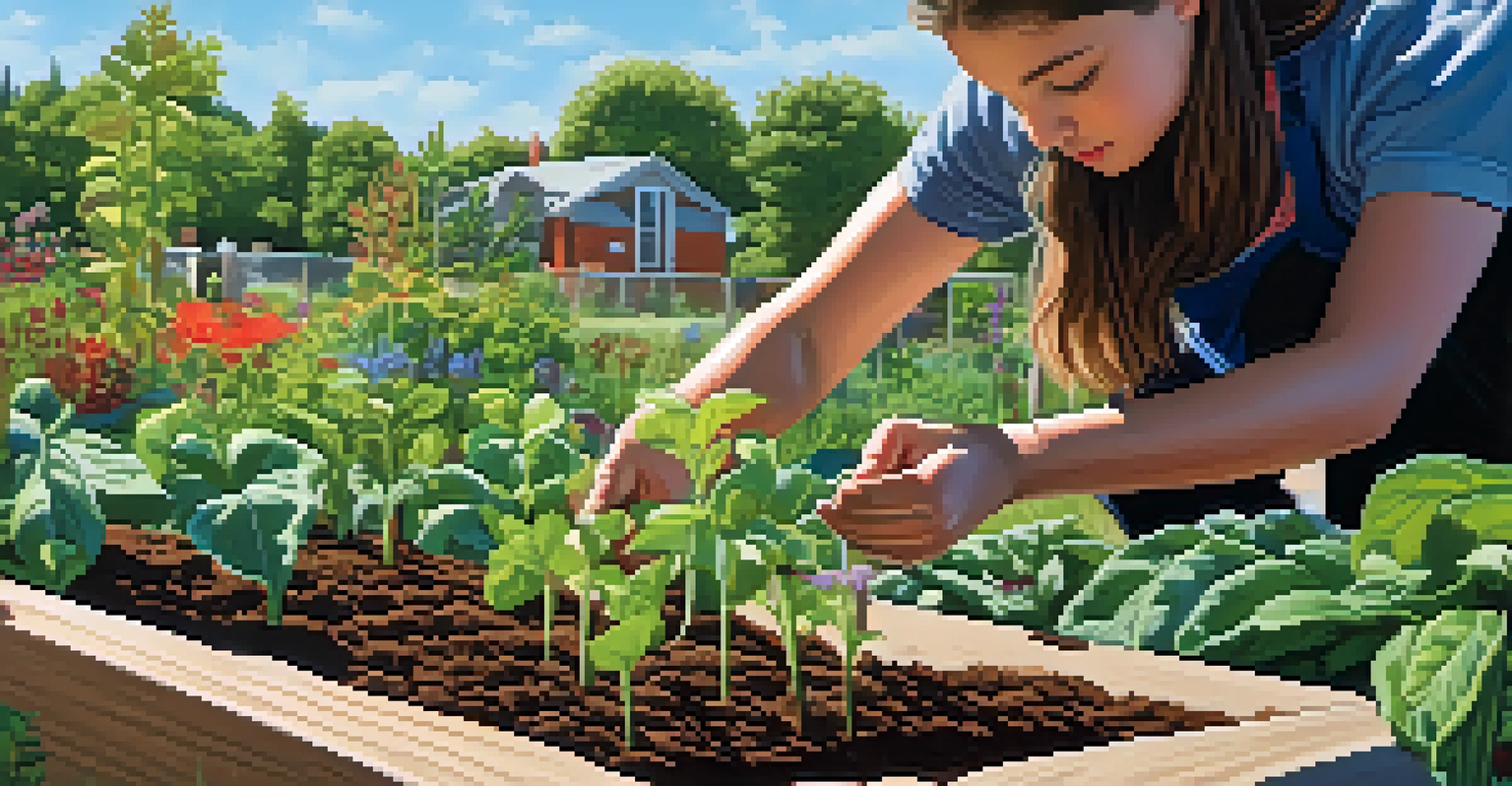Education for Sustainability: MSU's Programs and Community Outreach

Understanding Education for Sustainability at MSU
Education for Sustainability (EfS) is a transformative approach that integrates sustainability principles into education. At Michigan State University (MSU), this means preparing students to tackle real-world challenges related to the environment, economy, and society. MSU's commitment to EfS ensures that future leaders are equipped with the knowledge and skills necessary for sustainable practices.
Education is the most powerful weapon which you can use to change the world.
EfS goes beyond traditional teaching methods by emphasizing critical thinking and problem-solving. It encourages students to engage with sustainability topics actively, making learning both relevant and impactful. This approach is essential in shaping graduates who are not only knowledgeable but also passionate about making a difference.
Moreover, MSU’s curricular offerings reflect this philosophy, with numerous programs and courses dedicated to sustainability. Whether in agriculture, engineering, or social sciences, students can find pathways that align with their interests while contributing to a sustainable future.
MSU's Academic Programs Focused on Sustainability
MSU offers a variety of academic programs that focus on sustainability, preparing students for diverse careers. From the School of Environment and Sustainability to the College of Agriculture and Natural Resources, students have access to cutting-edge research and innovative teaching. These programs emphasize hands-on learning, often involving real-world projects that benefit local communities.

One standout program is the Bachelor of Science in Environmental Studies and Sustainability, which combines scientific knowledge with social science perspectives. This interdisciplinary approach helps students understand the complexities of environmental issues and develop holistic solutions. Additionally, graduate programs enable students to delve deeper into specialized fields, such as sustainable energy or urban planning.
Transformative Education for Sustainability
MSU integrates sustainability into education, preparing students to tackle environmental, economic, and societal challenges.
Furthermore, MSU encourages students to pursue sustainability-related internships and research opportunities. These experiences not only enhance learning but also foster connections with professionals in the field, paving the way for impactful careers.
Community Engagement: MSU's Outreach Initiatives
MSU’s commitment to sustainability extends beyond campus, reaching into the local community through various outreach initiatives. The university collaborates with local organizations to promote sustainable practices, educate residents, and foster a culture of environmental stewardship. This outreach is essential in creating a more sustainable community and empowering individuals to take action.
Sustainability is not a destination, but a journey we must take together.
One notable initiative is the MSU Extension program, which provides resources and education on sustainable agriculture and gardening. Workshops and events offer hands-on learning experiences, helping community members adopt sustainable practices in their own lives. This program not only benefits the environment but also strengthens community bonds.
Additionally, MSU hosts events like Sustainability Week, where students and community members come together to learn about and celebrate sustainability. These events feature workshops, guest speakers, and activities that inspire participants to think critically about their environmental impact.
Research at MSU: Leading the Way in Sustainability
Research is a cornerstone of MSU's approach to sustainability. Faculty and students engage in cutting-edge research that addresses pressing sustainability challenges, from climate change to resource management. This research not only contributes to academic knowledge but also has practical applications that benefit society.
One example is the work being done at the MSU Center for Global Change and Earth Observations, which focuses on understanding the impacts of environmental changes on human systems. By utilizing advanced technology and data analysis, researchers are able to provide insights that inform policy and community practices. This type of research is crucial for developing effective strategies for sustainable development.
Hands-On Learning Opportunities
Through various programs and internships, MSU emphasizes practical experiences that connect students with real-world sustainability issues.
Moreover, MSU encourages interdisciplinary collaboration, allowing researchers from different fields to come together to tackle complex sustainability issues. This collaborative approach fosters innovation and leads to more comprehensive solutions that can be implemented on a larger scale.
Student-Led Sustainability Initiatives at MSU
Students at MSU are not just passive learners; they actively engage in sustainability initiatives on campus and beyond. Various student organizations focus on promoting sustainable practices, raising awareness, and advocating for change. These groups empower students to take ownership of sustainability efforts, fostering a strong sense of community and responsibility.
For instance, the MSU Sustainable Agriculture Student Organization works to educate peers about sustainable farming practices. Through workshops, farm visits, and community events, they encourage fellow students to explore sustainable agriculture and its benefits. This hands-on approach helps cultivate a generation of environmentally conscious leaders.
Additionally, student-led events like campus clean-ups and sustainability fairs provide opportunities for students to get involved and make a tangible impact. These initiatives not only help the environment but also create a vibrant campus culture centered around sustainability.
Partnerships for Sustainability: MSU's Collaborative Efforts
MSU recognizes that achieving sustainability goals requires collaboration. The university actively partners with local governments, non-profits, and businesses to amplify its impact and share resources. These partnerships enable MSU to leverage expertise and foster innovative solutions to sustainability challenges.
One significant partnership is with the City of East Lansing, where MSU collaborates on initiatives like urban forestry and waste reduction programs. By working together, they aim to create a more sustainable urban environment that benefits both residents and students. This collaboration showcases how academia can play a vital role in community development.
Community and Global Collaboration
MSU engages in partnerships with local organizations and global networks to enhance sustainability efforts and drive impactful solutions.
Furthermore, MSU is involved in national and global networks focused on sustainability, allowing for knowledge exchange and best practices. By connecting with like-minded institutions, MSU enhances its sustainability efforts and contributes to a broader movement towards a more sustainable future.
Future Directions: MSU's Vision for Sustainable Education
Looking ahead, MSU is committed to expanding its sustainability initiatives and enhancing educational opportunities. The university aims to integrate sustainability into all aspects of campus life, from academics to operations. This holistic approach ensures that sustainability is not just a concept but a way of life for the MSU community.
To achieve this vision, MSU plans to develop new programs and courses that address emerging sustainability issues, ensuring that students are prepared for the challenges of tomorrow. This proactive approach is essential in an ever-changing global landscape where sustainability is paramount.

Ultimately, MSU's commitment to education for sustainability is about empowering individuals to make a difference. By fostering a culture of sustainability, MSU is not only shaping responsible citizens but also inspiring future leaders who will drive positive change in their communities and beyond.